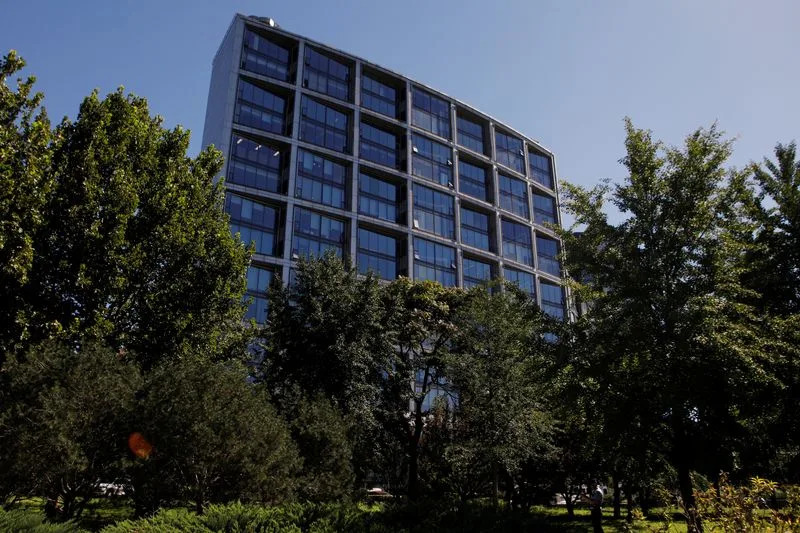CAPITALI$M WITH CHINESE CHARACTERISTICS
IS STILL CAPITAL$M; WITH EVERY BOOM COMES
A BUST
Reuters
Wed, November 22, 2023

FILE PHOTO: Zhongzhi Enterprise Group in Beijing
BEIJING (Reuters) -China's Zhongzhi Enterprise Group, a leading wealth manager, told investors it is heavily insolvent with up to $64 billion in liabilities, threatening to reignite concerns that the country's property debt crisis is spilling over into the broader financial sector.
The firm, which has sizable exposure to China's real estate sector, apologised to its investors in a letter that said it had total liabilities of about 420 billion yuan ($58 billion) to 460 billion yuan ($64 billion).
The liabilities compared to Zhongzhi's estimated total assets of about 200 billion yuan, according to the letter, which was issued on Wednesday and was seen by Reuters.
Beijing-based Zhongzhi did not immediately respond to a Reuters request for comment.
The worsening woes at Zhongzhi, a major player in China's $3 trillion shadow banking sector - roughly the size of the French economy - is set to rekindle worries about contagion, though some analysts expected regulators to step in to stem a wider fallout.
China's highly indebted property sector has been reeling from a liquidity crunch since 2020. Defaults by developers since late 2021 have impeded economic growth and rattled global markets.
Shadow banking-linked wealth managers in China typically operate outside many of the rules governing commercial banks and mainly channel the proceeds of wealth products sold to retail investors to real estate developers and other sectors.
'ENORMOUS' HOLE
Signs of trouble at the Zhongzhi group first came to light in July when Zhongrong International Trust Co, a leading trust company controlled by Zhongzhi, missed payments on dozens of investment products.
"The hole in its books is enormous," said Xu, who is an investor in a Zhongrong trust product and gave only her surname due to the sensitivity of the matter. "The firm has been in a mess."
Zhongzhi, whose business interests span from mining to wealth management, said in the letter that as the group's assets were concentrated in long-term debt and equity investments it was difficult to liquidate them and book the returns.
"Initial inspections show that the group is seriously insolvent and has significant continuing operational risks. The resources available for debt repayment in the short term are much lower than the group's overall debt scale," it said.
"The Zhongzhi group deeply apologises for the losses caused to investors. We fully understand the urgency, importance and seriousness of resolving this overall risk," the group said in the letter.
HIGH DEFAULT RISKS
Zhongzhi had hired one of the Big Four accounting firms to conduct an audit of the firm, and was seeking strategic investors, its management told investors in a meeting in August, according to a video seen by Reuters at the time.
The underlying assets of Zhongrong trust are largely property related, which have high default risks, said Xing Zhaopeng, senior China strategist at ANZ.
"The company cannot get the money back amid the property woes. So there are big discounts to its assets."
Starting off with timber and real estate trades in the 1990s, Zhongzhi quickly expanded into businesses ranging from chipmaking, healthcare, new energy vehicles and finance, according to its website.
Its financial businesses include trust, asset management, insurance, futures, and wealth management.
Zhongzhi has been selling stakes in some listed companies it controlled over the past few years, and reducing the size of its business, after coming under pressure in the wake of China's crackdown on shadow banking, and the property market downturn.
"Financial regulators are almost certain to intervene aggressively if there's any sign that Zhongzhi's troubles are spreading," said Christopher Beddor, deputy director of China research at Gavekal Dragonomics.
He added that the trust industry is only about 5% of the total financial system, so problems there are not necessarily life-threatening.
Beddor said the chance for investors to get full repayment of their investments is minimal. "Officials could certainly make retail investors whole if they want to, but they'd basically be turning their backs on years of attempts to undermine implicit guarantees. I suspect they won't."
($1 = 7.2111 Chinese yuan renminbi)
(Reporting by Ziyi Tang and Ryan Woo; Editing by Sumeet Chatterjee and Muralikumar Anantharaman)
No comments:
Post a Comment